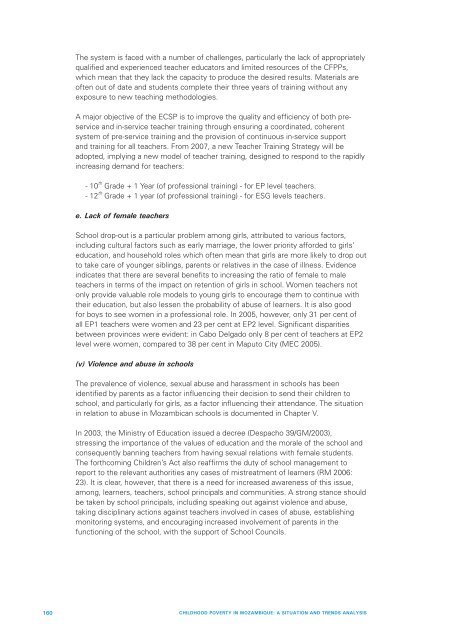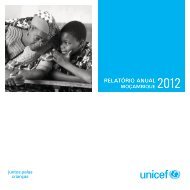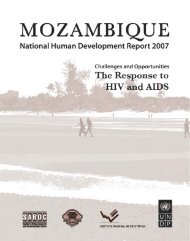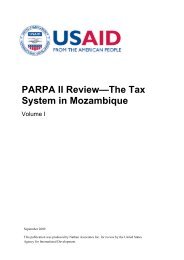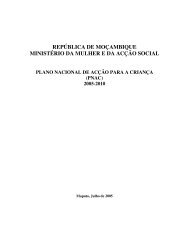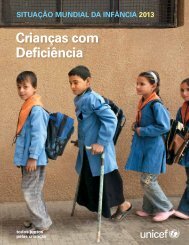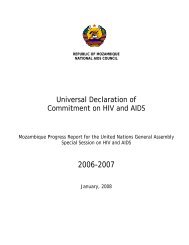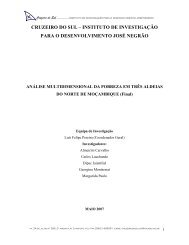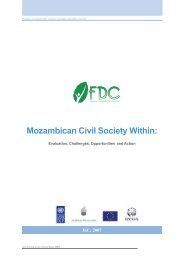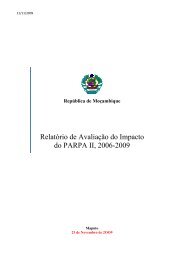Child Poverty in Mozambique. A Situation and Trend ... - Unicef
Child Poverty in Mozambique. A Situation and Trend ... - Unicef
Child Poverty in Mozambique. A Situation and Trend ... - Unicef
You also want an ePaper? Increase the reach of your titles
YUMPU automatically turns print PDFs into web optimized ePapers that Google loves.
The system is faced with a number of challenges, particularly the lack of appropriately<br />
qualified <strong>and</strong> experienced teacher educators <strong>and</strong> limited resources of the CFPPs,<br />
which mean that they lack the capacity to produce the desired results. Materials are<br />
often out of date <strong>and</strong> students complete their three years of tra<strong>in</strong><strong>in</strong>g without any<br />
exposure to new teach<strong>in</strong>g methodologies.<br />
A major objective of the ECSP is to improve the quality <strong>and</strong> efficiency of both preservice<br />
<strong>and</strong> <strong>in</strong>-service teacher tra<strong>in</strong><strong>in</strong>g through ensur<strong>in</strong>g a coord<strong>in</strong>ated, coherent<br />
system of pre-service tra<strong>in</strong><strong>in</strong>g <strong>and</strong> the provision of cont<strong>in</strong>uous <strong>in</strong>-service support<br />
<strong>and</strong> tra<strong>in</strong><strong>in</strong>g for all teachers. From 2007, a new Teacher Tra<strong>in</strong><strong>in</strong>g Strategy will be<br />
adopted, imply<strong>in</strong>g a new model of teacher tra<strong>in</strong><strong>in</strong>g, designed to respond to the rapidly<br />
<strong>in</strong>creas<strong>in</strong>g dem<strong>and</strong> for teachers:<br />
- 10 th Grade + 1 Year (of professional tra<strong>in</strong><strong>in</strong>g) - for EP level teachers.<br />
- 12 th Grade + 1 year (of professional tra<strong>in</strong><strong>in</strong>g) - for ESG levels teachers.<br />
e. Lack of female teachers<br />
School drop-out is a particular problem among girls, attributed to various factors,<br />
<strong>in</strong>clud<strong>in</strong>g cultural factors such as early marriage, the lower priority afforded to girls’<br />
education, <strong>and</strong> household roles which often mean that girls are more likely to drop out<br />
to take care of younger sibl<strong>in</strong>gs, parents or relatives <strong>in</strong> the case of illness. Evidence<br />
<strong>in</strong>dicates that there are several benefits to <strong>in</strong>creas<strong>in</strong>g the ratio of female to male<br />
teachers <strong>in</strong> terms of the impact on retention of girls <strong>in</strong> school. Women teachers not<br />
only provide valuable role models to young girls to encourage them to cont<strong>in</strong>ue with<br />
their education, but also lessen the probability of abuse of learners. It is also good<br />
for boys to see women <strong>in</strong> a professional role. In 2005, however, only 31 per cent of<br />
all EP1 teachers were women <strong>and</strong> 23 per cent at EP2 level. Significant disparities<br />
between prov<strong>in</strong>ces were evident: <strong>in</strong> Cabo Delgado only 8 per cent of teachers at EP2<br />
level were women, compared to 38 per cent <strong>in</strong> Maputo City (MEC 2005).<br />
(v) Violence <strong>and</strong> abuse <strong>in</strong> schools<br />
The prevalence of violence, sexual abuse <strong>and</strong> harassment <strong>in</strong> schools has been<br />
identified by parents as a factor <strong>in</strong>fluenc<strong>in</strong>g their decision to send their children to<br />
school, <strong>and</strong> particularly for girls, as a factor <strong>in</strong>fluenc<strong>in</strong>g their attendance. The situation<br />
<strong>in</strong> relation to abuse <strong>in</strong> Mozambican schools is documented <strong>in</strong> Chapter V.<br />
In 2003, the M<strong>in</strong>istry of Education issued a decree (Despacho 39/GM/2003),<br />
stress<strong>in</strong>g the importance of the values of education <strong>and</strong> the morale of the school <strong>and</strong><br />
consequently bann<strong>in</strong>g teachers from hav<strong>in</strong>g sexual relations with female students.<br />
The forthcom<strong>in</strong>g <strong>Child</strong>ren’s Act also reaffirms the duty of school management to<br />
report to the relevant authorities any cases of mistreatment of learners (RM 2006:<br />
23). It is clear, however, that there is a need for <strong>in</strong>creased awareness of this issue,<br />
among, learners, teachers, school pr<strong>in</strong>cipals <strong>and</strong> communities. A strong stance should<br />
be taken by school pr<strong>in</strong>cipals, <strong>in</strong>clud<strong>in</strong>g speak<strong>in</strong>g out aga<strong>in</strong>st violence <strong>and</strong> abuse,<br />
tak<strong>in</strong>g discipl<strong>in</strong>ary actions aga<strong>in</strong>st teachers <strong>in</strong>volved <strong>in</strong> cases of abuse, establish<strong>in</strong>g<br />
monitor<strong>in</strong>g systems, <strong>and</strong> encourag<strong>in</strong>g <strong>in</strong>creased <strong>in</strong>volvement of parents <strong>in</strong> the<br />
function<strong>in</strong>g of the school, with the support of School Councils.<br />
160 CHILDHOOD POVERTY IN MOZAMBIQUE: A SITUATION AND TRENDS ANALYSIS


